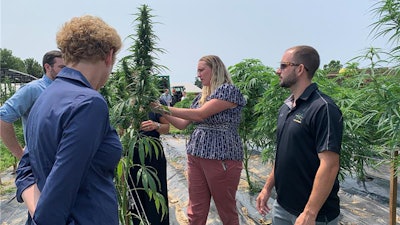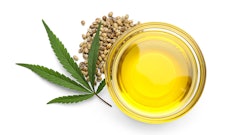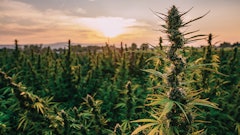
A group of 96 U.S. House Democrats are hoping to use the forthcoming, must-pass 2023 Farm Bill as a vehicle to pass 44 bills they sponsor, 35 of which are bipartisan proposals.
Founded in 1997 and self-described as a center-left caucus, the New Democrat Coalition (NDC) created a nine-member Farm Bill Task Force that is dedicated to working with the House Agriculture Committee as it advances specific changes for legislation that will succeed the Agriculture Improvement Act of 2018 (2018 Farm Bill), which will remain in force through 2023.
The 2018 Farm Bill includes regulatory guidance for the U.S. hemp industry as it relates to industrial hemp grown for fiber, grain and seed, as well as floral “cannabinoid hemp” and its derivatives—such as CBD and delta-8 THC. Notably, the 2018 Farm Bill defines hemp as a cannabis plant with no more than 0.3% THC on a dry-weight basis, which falls under the U.S. Department of Agriculture’s (USDA) jurisdiction.
But since the legalization of hemp in the U.S. under this Farm Bill, many industry-related actors have manufactured and sold intoxicating products from what some describe as a “derivatives loophole.” Because 0.3% THC on a dry-weight basis can yield substantial amounts of THC in heavier items like chocolate bars, cookies and other edibles, companies currently can skirt the law and ship these products throughout the U.S.
The 2018 Farm Bill also addresses the nation’s agricultural and food policies through a variety of programs, including nutrition assistance, crop insurance, commodity support and conservation. Many of these programs are related to the 44 bills endorsed by the NDC.
While several of the 44 bills have overlapping agricultural implications as they relate to the hemp industry, one bill in particular is primarily specific to hemp: The Industrial Hemp Act of 2023 (House Bill 3755). This bipartisan legislation, sponsored by NDC member Rep. Chrissy Houlahan, D-Pa., would create a separate classification for industrial hemp and establish a framework that “punishes bad actors,” according to the bill.
“On behalf of the more than 40 hemp farmers in my community, I’m thrilled our effort is building momentum in Congress,” Houlahan told Cannabis Business Times. “Many of the best legislative ideas come from everyday conversations when I’m out and about in Pennsylvania, and the Industrial Hemp Act of 2023 is no exception. During visits to local hemp farms, I heard the unique difficulties facing this versatile industry. My bipartisan legislation will provide clarity and ultimately help make industrial hemp growers an even stronger contributor to our local economy.”
Under the 2018 Farm Bill, “vague regulatory framework” makes it difficult for industrial hemp growers to compete with other commodity crops and creates confusion among banking, transportation, insurance, advertising, and other related industries, according to Houlahan and H.B. 3755 co-author Rep. Matt Rosendale, R-Mont.
The legislation intends to amend the Agricultural Marketing Act of 1946 to exempt industrial hemp from certain requirements under the hemp production program, whereas hemp grown for various uses of stalks (including fiber), grain or seeds isn’t regulated in the same manner as floral, cannabinoid-rich hemp.
The legislation also includes a provision that would make it so visual inspections of industrial hemp on an annual basis would fulfill certain regulatory requirements.
Currently, burdensome regulations are preventing industrial hemp farmers from taking full advantage of the agricultural market, Houlahan and Rosendale said in a press release announcing their bill earlier this year. The Industrial Hemp Act intends to remove red tape holding these farmers back, they said.
“Hemp is relatively easy to grow, resistant to pests that kill other crops, good for the soil, and is a high-yield product,” Houlahan said. “All of these qualities make it attractive to farmers. It’s used to make a range of goods including biodegradable fibers and biofuels. Unfortunately, today these farmers face regulations that are a little outdated.”
Houlahan and Rosendale aren’t the only ones trying to make distinctions between industrial hemp and cannabinoid hemp in U.S. agricultural and food policies, where the opportunity for revised legal framework only comes around every five years through the legislative process.
Earlier this month, the Cannabis Regulators Association (CANNRA), a nonpartisan association of government officials representing cannabis and hemp regulatory agencies from 45 member states and U.S. territories, urged U.S. lawmakers to adjust Farm Bill policies to address hemp-derived cannabinoids to protect consumer safety and public health.
Notably, the association asked leaders on the House and Senate agricultural committees to provide clear boundaries and definitions for products that will be regulated under cannabinoids and cannabinoid hemp products in the forthcoming Farm Bill.
RELATED: Cannabis Regulators Association Calls on Congress to Adjust Hemp Laws in 2023 Farm Bill
More broadly, NDC Farm Bill Task Force leaders are hoping their 44 endorsed bills address five agricultural policy priorities by the coalition:
- Revitalizing rural areas through broadband deployment;
- Strengthening nutrition programs to combat food insecurity;
- Providing certainty for growers and producers, particularly beginner, young, and socially disadvantaged producers;
- Enhancing research capacity to bolster trade promotion and marketing to expand international markets; and
- Utilizing agriculture to improve the environment and strengthen food supply chains.
“Americans are counting on Congress to advance a Farm Bill that not only bolsters our agriculture economy, but funds key programs that empower rural communities, support families who depend on our agricultural industry, conserve our natural resources, and ensure no one in this country goes hungry,” NDC task force Chair Kim Schrier, D-Wash., and vice chairs Jim Costa, D-Calif., and Don Davis, D-N.C., said in a Sept. 25 press release.
The hemp industry is included in this effort aimed at supporting agricultural producers, investing in rural communities, and boosting American agricultural competitiveness.


























